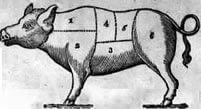“There’s a real culture of secrecy here that influences everything,” the former executive said.
Some other technology companies operate differently.
“We talk to a lot of outsiders,” said Gary Niekerk, director of corporate citizenship at Intel. “The world’s complex, and unless we’re dialoguing with outside groups, we miss a lot.”
The probophile', Davies and Kenny write, ' places false confidence in numbers ,
and uses these as his focus for justification of activity, ...
Probophilia
In much the same vein: ‘Probophilia’, a doctor writes, ‘is a pathological love of verification over achievement’. Ivan Tyrell, a leader in the Human Givens movement (a profoundly constructive and efficacious approach to mental health), described the same phenomenon as ‘obsessive target disorder’. The point being made is that those who suffer from this disorder are mad but they don’t know it.
The probophiles create their own disconnected world, the doctor writes. It is so true. Some fledgling systems thinkers in the NHS who have tried to get a dialogue going with managers about the need to study the system and then change the measures etc find themselves ostracised and vilified. It is like something out of a Dilbert cartoon. The mind-blocked probophiles cannot even connect, to do so would disturb their psychological edifice, so they attack instead. We should worry, over the last ten years the NHS has created a monstrous management culture. If this continues in the new structures we can only expect more of the same.
You can read the doctor’s paper here:
http://www.civitas.org.uk/nhs/download/probophilia.pdf
conversation
n.
- The spoken exchange of thoughts, opinions, and feelings; talk.
- An instance of this: held a long conversation on the subject.
- An informal discussion of a matter by representatives of governments, institutions, or organizations.
conversationally con'ver·sa'tion·al·ly adv.
---
dialogue
n.
- A conversation between two or more people.
- Conversation between characters in a drama or narrative.
- The lines or passages in a script that are intended to be spoken.
- A literary work written in the form of a conversation: the dialogues of Plato.
- Music. A composition or passage for two or more parts, suggestive of conversational interplay.
- An exchange of ideas or opinions: achieving constructive dialogue with all political elements.
v., -logued, or -loged, -logu·ing, or -log·ing, -logues, or -logs. v.tr.
To express as or in a dialogue.
v.intr.
- To converse in a dialogue.
- Usage Problem. To engage in an informal exchange of views.
[Middle English dialog, from Old French dialogue, from Latin dialogus, from Greek dialogos, conversation, from dialegesthai, to discuss. See dialect.]
dialoguer di'a·log'uer n.
USAGE NOTE In recent years the verb sense of dialogue meaning "to engage in an informal exchange of views" has been revived, particularly with reference to communication between parties in institutional or political contexts. Although Shakespeare, Coleridge, and Carlyle used it, this usage today is widely regarded as jargon or bureaucratese. Ninety-eight percent of the Usage Panel rejects the sentence Critics have charged that the department was remiss in not trying to dialogue with representatives of the community before hiring the new officers.
 The source of this phrase is often said to be the fact that the best cuts of meat on a pig come from the back and upper leg and that the wealthy ate cuts from 'high on the hog', while the paupers ate belly pork and trotters. The imagery of lords and ladies feasting on fine meats,
The source of this phrase is often said to be the fact that the best cuts of meat on a pig come from the back and upper leg and that the wealthy ate cuts from 'high on the hog', while the paupers ate belly pork and trotters. The imagery of lords and ladies feasting on fine meats, 

